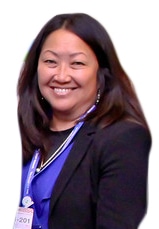 This article is part of a new series of interviews with Corps Staff members.
This article is part of a new series of interviews with Corps Staff members.
Gina Carroll is the Director of Conservation Programming for Kupu, operators of the Hawaii Youth Conservation Corps. She talks about her experience working at the Corps, the challenges faced by Hawaii’s youth, and Kupu’s culture of being pono.
1. What are some of the projects that your Corps is working on right now that excite you the most?
The Hawaii Youth Conservation Corps is 1 of 4 major programs within Kupu. Currently we are working to provide Community U, a program designed for disconnected young adults, program structure and long-term funding. 21st Century Conservation Service Corps projects in the Hawaii Volcano National Park and the Haleakala National Park give Kupu the opportunity to increase our reach into the middle schools to improve awareness of the National Park System in their own neighborhood.
2. What kinds of careers are typically available in your neck of the woods for Corpsmembers?
Careers range from food service, tourism, construction, volunteer coordinators, wildlife technicians, field technicians, park directors and program coordinators. In the past 2 years, we were able to bring on 6 of our own Corpsmembers into staff positions.
3. What are some of the most typical problems you face when working with Corpsmembers, and how do you solve them?
Many of our members have little to no family support. They often lack motivation and direction and many are without any sense of work ethic. Poor attendance, chronic tardiness, and poor communication skills are all common issues. I’m not sure we ever solve the problem, however we do try to reduce the barriers or excuses. Asking why they are chronically late will probably evoke an excuse. Asking what is going on at home that is making them chronically late will evoke an answer that is closer to the truth. We do our best to set them up for success by eliminating as much of the barriers/excuses as possible. When problems persist, there might be a ‘special’ barrier they need assistance in removing.
4. What’s something about your organizational culture that you are proud of and something you want to improve?
Kupu culture prides itself on being pono. Pono is the Hawaiian word for righteous, upright and moral. We teach this value formally through orientations and trainings, and informally through the way we conduct ourselves day to day. Pono is the guidance we use when there is no clear rule, it’s the unspoken guide, ‘is this right?’ ‘Did we decided correctly on this?’ I hope that when it is all said and done, and the job is complete, people can say Kupu did the right thing.
One thing I’d like to improve? I’d like some time to find ways to best support our staff in their own personal development. They spend so much time and intentional energy into creating amazing programs each year that to me, change lives. Their efforts touch the lives of hundreds of members each year that ultimately create a stronger community. There are not enough ways to let them know how much they are appreciated and how much better our future will be because of them.
5. What’s your favorite kind of terrain and why (Beach, mountain, forest, lake, tundra, etc…)?
I honestly cannot say I have a favorite terrain because growing up in Hawaii, these parts of home all have a purpose in balancing my life. However, my most recent epic field experience is on the slopes of Haleakala on the island of Mau’i. Being flown in (and out) by helicopter to the 5,000 ft. elevation of this dormant volcano was breathtaking. Our team worked in this area for 5 days at a time alongside amazing trees that were 100s of years old. Planting native seedlings on a 30-40% grade, in 50 degree cloud cover with a sweeping view of the Pacific Ocean is my newly experienced terrain. Why? Besides the obvious beauty of the landscape, working in the mist and gazing across the ocean toward the snow capped mountains of the neighboring island brings more than dew to your brow. The work will bring tears to your eyes and peace in your heart knowing that you have just planted your contribution to a future you will probably never see.
6. What’s something accessible to the masses (a movie, tv show, song, book, event) that has inspired or influenced you recently?
“If you’re out there” by John Legend. … be the change we want to see. I am also inspired by the many video clips on YouTube and photos on Instagram created by our members that remind me of the importance of what we do.
7. What’s one of the best pieces of advice a mentor has given you?
There is a plan and purpose for your life. Be intentional and don’t give up until you know you found it.
Previous Interviews in this Series
Michael Muckle of the New Jersey Youth Corps of Phillipsburg





































































